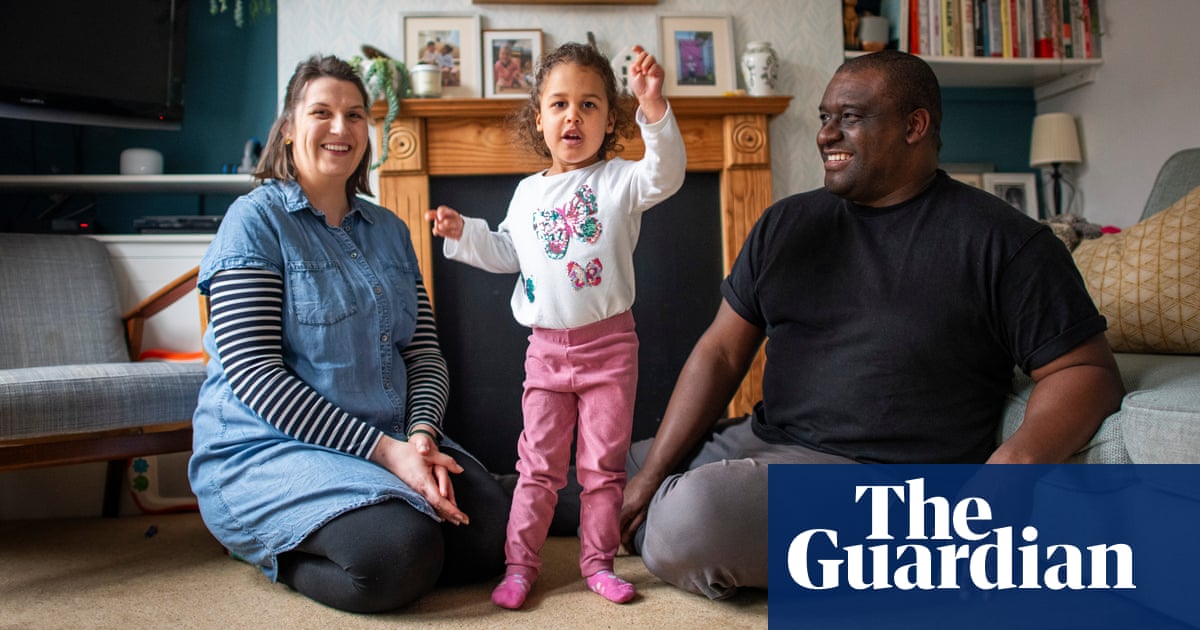“I think we’ve got used to it,” says Jess Daly with some resignation of the experience of juggling family finances in a cost of living crisis that is now into its third year.
The latest UK inflation data for February is due out on Wednesday, with analysts expecting the headline rate to fall to 3.5%. In January the figure remained unchanged at 4%, as rising gas and electricity bills were offset by the first fall in food prices in more than two years and winter sale bargains.
After a difficult period the Dalys, who first spoke to the Guardian about their soaring bills in 2021, can see some light at the end of what has been a very long tunnel. But their optimism has little to do with the recent budget or government claims to have taken “action” to bring down inflation.
There is joy at the prospect of a second child – a sister for Robin due next month – as well as more financial security for the couple, who live in Norwich. Jess, a library administrator at the University of East Anglia, faced redundancy last year but held on to her position, while her husband, Jon, recently moved to a better job at a large financial services firm.
In the supermarket Jess notices some prices falling. She recently paid “just” £1.60 for butter with the reduction remarkable enough to catch her eye (official data shows the cost of a 250g block peaked at £2.36 last year). “I am much more aware of how much things cost,” she says.
But more than food prices or energy bills coming down – in April the energy price cap in Great Britain will fall by £238 to £1,690 – the thing that has made the biggest difference to their finances is their daughter Robin’s third birthday, which they celebrated with a picnic in a local park, with friends and family, on a gorgeous spring day.
Even though Robin’s grandparents pitch in, the cost of childcare has been a “significant challenge” and played on the couple’s mind as they weighed up having another baby. But her milestone means the family now qualify for 30 hours free childcare a week, which will mean a £250 saving on their £475 monthly bill.
“We are looking forward to having some disposable income,” says Jess. “For us, Covid, the cost of living crisis and having a baby all collided and we have adopted quite a different lifestyle,” she says. “We spend almost nothing on socialising.”
“We don’t go out,” confirms Jon.
“The past 12 months have definitely been rocky,” he adds. “But there’s always been this silver lining of Robin turning three which would mean that our childcare costs would come down. I’ve just got this new job which brings in more money, too.”
Money hacks that offered consumers simple ways to save money at the start of the cost of living crisis – such as switching supermarkets or buying their own label over big brands – are now ingrained habits. At this point in the crisis the couple, who do not eat meat and flit between Asda and Morrisons, have done all they can to cut the cost of the weekly shop.
“We made changes to our lifestyle and have stuck with them,” Jon says.
The family are careful budgeters and keep a spreadsheet of their expenditure so they can track their household finances back to 2018.
This time last year the energy bill for their three-bed terrace home was just over £200 a month but they report that now it is £115. It is a big improvement but not back to pre-crisis levels. In 2019 their direct debit was just £45.
after newsletter promotion
Set by the energy regulator, Ofgem, the new price cap from April is a 12.3% reduction from £1,928 in the current quarter. The return of fixed-rate gas and electricity deals means the couple are once again considering the pros and cons of a “fix”.
Looking back over their outgoings, Jess says the most notable increases have been for utilities, food and petrol. “Council tax is pretty bad,” she says. “That’s gone up from £137 a month in 2018 to £178 for this year. Pretty much everything else has gone up of course: streaming services, insurance, breakdown cover, TV licence and vet bills [for their cat, Polly], just not by such shocking amounts.”
In its post-budget analysis the Institute for Fiscal Studies (IFS) warned that despite the chancellor’s tax cuts, which included a 2p cut to national insurance contributions, households would be worse off at the election, expected this year, than at the start of this parliament in 2019.
Luckily the Dalys managed to secure a new five-year mortgage deal before the market meltdown triggered during Liz Truss’s brief stint as prime minister. “We managed to get away with our mortgage payments only going up by £50 a month … so that was a big relief,” Jess says.
However, she is worried about the trade-off between tax and spending on public services. “We’re in a period of our lives where we are going to be relying more than ever on public services like healthcare and education,” she says. “In Norwich we nearly lost our walk-in health centre. It’s still open, because we fought to keep it open, but on reduced hours.”
Now in the final weeks of her pregnancy, she is hopeful that by the time her baby is ready to go to nursery sometime in 2025 they will have access to the 30 hours of free childcare a week promised to working parents of all children over the age of nine months.
“I’m really hopeful about the new government policies around childcare because with this second baby that will make a big difference,” Jess says. “I would like to think that we’ve spent the most on childcare that we’re ever going to have to spend.”







